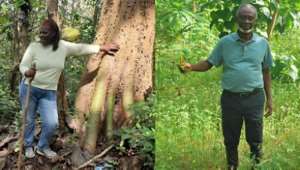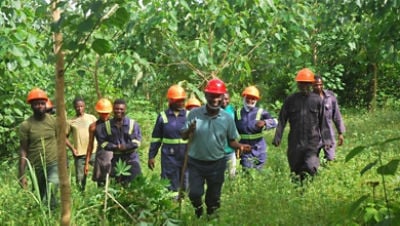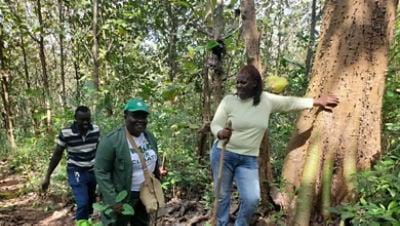 Photo: Ghanaian entrepreneurs Kwame Bonsu and Joann Ofori are harnessing the power of the forest for their plantation businesses.
Photo: Ghanaian entrepreneurs Kwame Bonsu and Joann Ofori are harnessing the power of the forest for their plantation businesses.Ghana’s lush forest landscapes are more than just a natural resource—they are a central part of the national economy and a job creator.
Facing persistent threats from agricultural expansion, illegal mining and logging, and unsustainable land use, these landscapes remain under pressure. Yet, a green revival is taking root—driven not just by governments and conservationists, but by bold entrepreneurs like Kwame Bonsu and Joann Ofori.
Kwame Bonsu, a visionary entrepreneur, founded Sakam Savana with a mission to restore the Afram Headwaters Forest Reserve and uplift local communities. For Kwame, the restoration of the forest ecosystem serves two powerful objectives: to offset deforestation and drive local economic development.
“Of course, I want to get the forest back. But it’s also about improving the quality of life for rural communities—the people who depend the most on the forest,” he explains.

Photo: Kwame Bonsu (center) with some employees from Sakam Savana
In 2021, Kwame received a loan for his plantation from a Forestry Commission scheme under Ghana’s Forest Investment Program—a nine-year program financed by the Climate Investments Funds and implemented by the World Bank.
With the loan, Kwame expanded his business, employing over 180 people and boosting food security for nearby communities. “There are eleven small rural communities surrounding us and most of these people rely on farming for income generation,” he explains.
Kwame piloted sustainable agroforestry practices, combining tree planting with traditional farming through intercropping. He planted more than 20,000 fruit trees, including mango, alongside his teak trees. In time, Kwame observed improved crop yields and better profitability.
Joann Ofori, the dynamic force behind Lordamn Farms Ltd., leveraged the plantation loan to expand her teak plantation, creating jobs and fostering environmental stewardship.
The cash injection allowed Joann to double the land area of her teak plantation from 70 hectares to the full 140 hectares that had been allocated to her by the Forestry Commission. With the loan, she bought seedlings and hired additional labor, allowing her to plant progressively and cover the entire area within a year. This expansion not only restored the forest and benefited the environment but also provided economic opportunities for local families.

Photo: Joann Ofori (right), owner of Lordamn Farms Ltd., on her land outside Accra
She also diversified the type of crops planted—opting for eggplant, maize, and okra—which provided short-term gains to her business while waiting for the plantation’s teak trees to mature.
For Joann, the benefits have been manifold. “You can breathe better and everywhere you look it’s lush and green. I’m at peace with nature and I encourage more women to go into this business.”
Ghana’s Forest Investment Program, which ran from 2015 to 2023, reduced deforestation and forest degradation by strengthening policies, landscape management, and institutions, while piloting community-based forest and landscape management that devolved greater rights and responsibilities to local communities and farmers.
The loan scheme piloted by the project aimed at increasing financial access for small- and medium-scale plantation schemes and building private sector engagement in reducing deforestation and forest degradation—which in turn provided economic benefits to forest communities. Kwame and Joann’s businesses are two of about 100 small- and medium-sized enterprises to have benefited from the loan scheme.
In addition to the plantation loan scheme, the project provided financial support and training to cocoa farmers and helped local communities diversify incomes. From Tarkwa and Takoradi in the south to Kintampo and Atebubu in the heart of Ghana, the project brought more than 80,000 hectares of land under improved management, including nearly 44,000 hectares under improved sustainable cocoa practices. About 106,000 people living in and around Ghana’s High Forest Zone benefited from project activities.
Building forest economies is crucial to addressing poverty and creating jobs on a livable planet. Today, more than 2.5 million people across Ghana rely on forests for their livelihoods, particularly in rural areas.
Ghana’s achievements under its World Bank-implemented Forest Investment Program have gleaned many invaluable lessons on building up the country’s forest economy. As in the cases of Kwame and Joann, people-centered approaches that leverage the innovative spirit of Ghana’s entrepreneurs are sure to drive successes in both current and future investments. The loan scheme also demonstrated how forest enterprises can build relationships with financial institutions for long-term financial access, a critical component for building a forest economy.
Building on these achievements, the World Bank is focusing on scaling up such people-centered outcomes through the Global Challenge Program: Forests for Development, Climate, and Biodiversity. This enhanced framework is designed to help countries like Ghana deepen their investment in forests and translate lessons learned—such as unlocking financial access for forest enterprises—into broader, long-term impact. By aligning local innovation with global support, the program lays the foundation for sustainable growth in Ghana’s forest sector.
With continued support from national and international partners, Ghana’s forests will continue to thrive, providing economic, environmental, and social benefits for generations to come.


